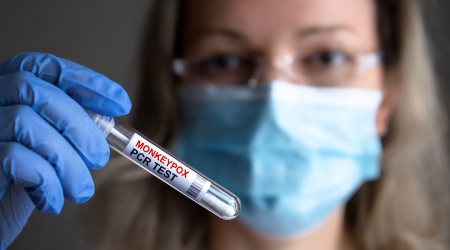
Eligibility
Eligibility for Mpox vaccination has expanded. People of all ages who meet the eligibility criteria can sign up for vaccination appointments.
The following people are eligible to be vaccinated in NYC:
NOTE: People who are breastfeeding or pregnant who are otherwise eligible for vaccination can get vaccinated. For more information, see the JYNNEOS FAQ.
If you have had Mpox, then you likely have some protection against another infection and are currently not eligible to get a first or second dose.
Vaccination
The current Mpox outbreak has affected some populations more than others. In addition, the risk of getting Mpox is higher among people who engage in certain activities or have certain health conditions. Based on this, the JYNNEOS vaccine is recommended for people who meet the above eligibility criteria and:
- Are men whose sex partners are men (cisgender or transgender), transgender women or gender nonconforming or nonbinary individuals; especially those who have been diagnosed with a sexually transmitted infection (STI) in the past six months
- Are transgender, gender non-conforming or gender non-binary, especially those who have been diagnosed with an STI in the past six months
- Are cisgender women whose sex partners are men who have sex with men or who are transgender, gender non-conforming or gender non-binary
- Participate or may participate in sex parties or other events where there is minimal clothing and direct, frequent, or prolonged skin-to-skin contact
- People who have had or anticipate having sex at a commercial sex venue or sex in association with a large public event
- Are taking HIV pre-exposure prophylaxis (PrEP)
- Are living with HIV
- Sex workers, erotic workers and anyone engaging in survival sex or any other types of transactional sex (including sex in exchange for money, food, shelter or other goods) of any sexual orientation or gender identity
Please note: You must bring one of the following to your vaccination appointment:
- Driver’s license or non-driver ID
- IDNYC
- Birth certificate issued by a state or local government
- Current U.S. passport or valid foreign passport
- Permanent resident card
- Certificate of Naturalization or Citizenship
- Life insurance policy with birthdate
- Marriage certificate with birthdate
Vaccine Side Effects
Common side effects of the vaccine include tiredness, headache and muscle pain. There may also be redness, swelling, soreness and itchiness where you received the injection. Generally, the injection site side effects from an intradermal injection are worse and last longer than those from a subcutaneous injection.
Intradermal injections can result in long-term or permanent scarring, discoloration and thinning of the skin at the injection site. The risk for these types of reactions is higher for people with darker skin.
At this time, TBHC is only providing subcutaneous administration of the Mpox vaccine to minimize adverse reactions.
General Information
Mpox is a contagious disease caused by the Mpox virus. There is currently an outbreak of Mpox in the U.S. and other countries where the virus does not usually spread.
Anyone can get and spread Mpox. The current cases are primarily spreading through sex and other intimate contact among social networks of gay, bisexual and other men who have sex with men (MSM); transgender people; gender-nonconforming people; and nonbinary people. People in these social circles who have multiple or anonymous sex partners are at a high risk of exposure.
If you have a new or unexpected rash or sores, contact a health care provider.
In the current outbreak, the Mpox virus is spreading mainly during oral, anal and vaginal sex and other intimate contact, such as rimming, hugging, kissing, biting, cuddling and massage.
The virus can spread through:
- Direct contact with a rash or sores of someone who has the virus
- Contact with clothing, bedding and other items used by a person with Mpox
- Prolonged face-to-face contact
Experts are currently studying whether the virus can also spread through semen, saliva, feces and other body fluids.
People can spread the virus when they have symptoms. Experts are studying whether the virus can spread before symptoms start or after they end.
Symptoms and Testing
If you have symptoms of Mpox, you should see a health care provider for testing. TBHC’s PATH Center offers appointments for patients who suspect they may have Mpox. Schedule an appointment, or call 1-833-TBHC-NOW (833-824-2669).
For more information and resources please visit: https://www1.nyc.gov/site/doh/health/health-topics/monkeypox.page